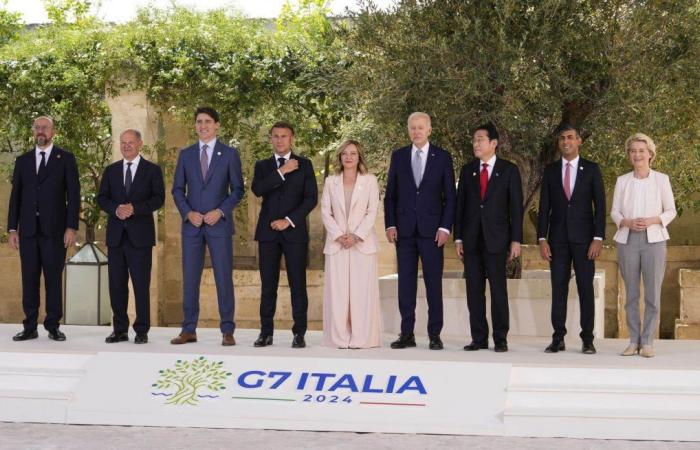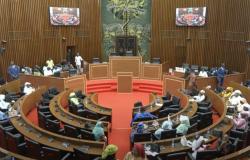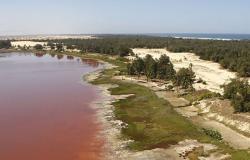Like a lake-on-the-shoulder, but by the sea. Since Thursday and until Saturday, the leaders of the 7 richest democratic countries on the planet — United States, Canada, Germany, France, United Kingdom United, Italy and Japan – are gathered in Borgo Egnazia, near Bari, in Puglia in Italy, for a summit charged as much by the list of subjects put on the table as by the tensions of the world which is agitated all around. But what is this G7 meeting preparing to deliver?
A political agreement on the use of frozen Russian assets
The squaring of the circle has just been partly resolved by the leaders of the G7 who, on Thursday, reached a “political agreement” on the complicated use of Russian assets frozen in the wake of the armed aggression launched by Moscow against Ukraine in February 2022. The group agreed to provide a loan of $50 billion to help rebuild the former Soviet republic, a significant sum guaranteed by the interest generated by around $300 billion in Russian assets immobilized by the West.
The vast majority of these assets are held in European Union countries. Ukraine should get its hands on the envelope by the end of the year.
For more than a year, the leaders of Western countries have been looking for a legal way to pass this money confiscated to the Russian aggressor and put it into the hands of Ukraine, whose vital infrastructure and population are relentlessly shelled by the forces of dictator Vladimir Putin.
On Wednesday, White House national security adviser Jake Sullivan said the agreement was intended to “provide Ukraine with the resources needed now for its economic strength and other needs so that it can to have the resilience to resist Russia’s continued aggression.”
The needs are immense. Last February, the World Bank estimated the costs of Ukraine’s reconstruction and recovery at $486 billion over the next 10 years.
A security agreement between Ukraine and the United States
The Biden administration’s support for Ukraine is strong. But it was symbolically reinforced in Italy with the signing of a 10-year bilateral security agreement between kyiv and Washington. “We want to demonstrate that the United States supports the Ukrainian people, that we stand with them and that we will continue to meet their security needs, not only tomorrow, but also in the future,” summarized earlier in the day Jake Sullivan.
The Democratic president met his counterpart Ukrainian, Volodymyr Zelensky, special guest at this G7 summit in the afternoon. According to details revealed by the Washington Post, this military assistance agreement, partly modeled on that which exists between the United States and Israel, does not include the deployment of American troops in Ukraine nor the allocation of new financial aid. The Ukrainian president described this agreement as “unprecedented” upon his arrival in Italy on Thursday.
Ukraine is also expected to sign a similar agreement with Japan at this summit.
The delicate achievement of a ceasefire in Gaza
In the context of a luxurious hotel in Puglia where the leaders of the G7 are gathered, it is also the misery and destruction of the Gaza Strip that must be discussed, after the approval by the group, more early in June, of the three-phase plan presented by Joe Biden to end the war launched by Israel against the Palestinian enclave. The conflict began the day after an unprecedented aggression by Hamas against the Jewish people. It has since fueled opposition and divisions in most of the Group of Seven countries, particularly in Canada, where pockets of students occupy campuses to demand an end to this war with unbalanced human losses.
It is difficult to say where the discussions held between now and Saturday in Italy could lead, after Hamas responded to the American proposal on Tuesday by suggesting several changes to the peace plan. The terrorist organization, which controls the Gaza Strip, wishes, among other things, to obtain assurances of a permanent end to the war.
“Some changes are possible, others are not,” US Secretary of State Antony Blinken said on Wednesday from Doha, Qatar, where he met Qatari Prime Minister Mohammed bin Abderrahmane Al Thani. of union between Hamas and the West.
According to Jake Sullivan, the United States is actively working with the Egyptians and Qataris to bridge differences and seems determined to reach the end of this umpteenth attempt at a ceasefire.
“The president will consult with G7 leaders on the intensive efforts underway to achieve this,” he said. And he has their full support. »
Continue thinking about artificial intelligence
This marks a first for the G7: at the invitation of the Italian Prime Minister, Giorgia Meloni, who holds the rotating presidency of the organization this year, Pope Francis is to speak there on Friday as part of a meeting on on the ethical issues of artificial intelligence. He thus becomes the first pontiff to take part in a summit of the seven richest democratic countries on the planet.
In April, Mme Meloni included this unique participation in the group’s desire to define a “regulatory, ethical and cultural framework for artificial intelligence”, while testing the capacity of the international community to achieve this complex objective.
AI found itself at the heart of a speech given on 1er last January by Pope Francis, who called on the developers of this technology to keep in mind the human potential that, according to him, they must serve. “Artificial intelligence will become more and more important. The challenges it poses are technical, but also anthropological, educational, social and political,” he said.
Protecting the image of several weakened leaders in their own homes
The union of the group cannot make us forget that several of its elements landed in Italy on Thursday damaged by the news of the last days, even weeks and months, in their own country. This is the case for Joe Biden, who, at home, on the North American continent, must deal with the threatening return of Donald Trump to the political scene. This sulphurous character is more in symbiosis with the autocratic leaders of the world than with the defenders of democracy and threatens to undo all of the security agreements that the American president is preparing to sign during this summit.
On the French side, Emmanuel Macron, champion of centrist progressivism, finds himself alongside the Italian Prime Minister, from the post-fascist far right, after having suffered a significant defeat during the European elections, precisely against the extreme right of his country. The decline of Mr. Macron’s party at the polls prompted him to trigger legislative elections in France which could disrupt the rest of his presidency, by opening the door to power to the radical right party of Marine Le Pen and Jordan Bardella.
The German chancellor, Olaf Scholz, arrived with the same stigma after his social democrats were rejected by voters during the European elections. As for the British Conservative Prime Minister, Rishi Sunak, he is also on borrowed time, on the eve of next July’s elections in his country which should return 10 Downing Street to Labor.
With Agence France-Presse






